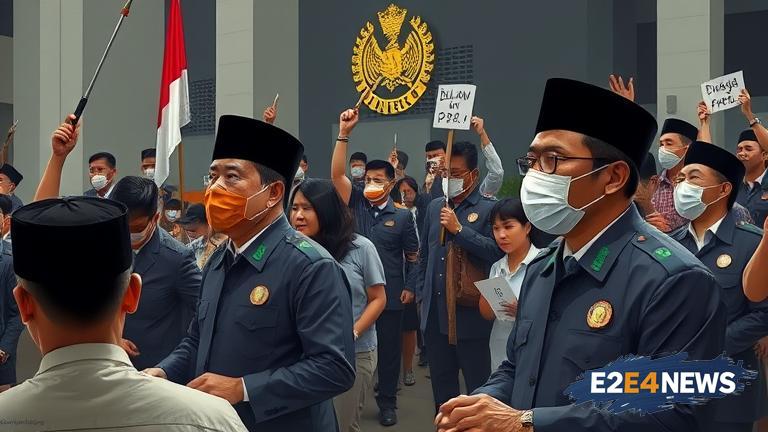Protests have broken out across Indonesia as citizens express their outrage over the excessive salaries of lawmakers. The demonstrations, which have been ongoing for several days, are a response to the recent revelation that Indonesian lawmakers are among the highest-paid in the world. Despite the country’s economic struggles, lawmakers have continued to receive hefty salaries, sparking widespread anger and frustration among the population. The protests, which have been largely peaceful, have drawn attention to the significant disparity between the salaries of lawmakers and the average Indonesian citizen. Many have taken to social media to express their discontent, using hashtags such as #TurunkanGajiDPR to call for a reduction in lawmakers’ salaries. The issue has also sparked a national debate about the role of lawmakers and their responsibilities to the people. Some have argued that lawmakers’ salaries should be tied to their performance and the country’s economic growth, rather than being automatically increased every year. Others have suggested that the excess funds could be better spent on vital public services such as healthcare and education. The protests have also highlighted the need for greater transparency and accountability in government, with many calling for lawmakers to be more open about their finances and decision-making processes. As the protests continue, it remains to be seen whether the government will take action to address the concerns of the people. The Indonesian government has thus far remained silent on the issue, sparking further criticism and anger among the population. The protests are a significant test of the government’s commitment to democracy and its willingness to listen to the concerns of its citizens. If the government fails to respond to the protests, it could lead to further unrest and instability in the country. The international community is also watching the situation closely, with many expressing concern about the potential for violence and instability. The United States, in particular, has urged the Indonesian government to respect the rights of its citizens and to take steps to address their concerns. The European Union has also issued a statement calling for calm and restraint, while emphasizing the importance of democratic principles and human rights. As the situation continues to unfold, it is clear that the protests are about more than just lawmakers’ salaries – they are about the fundamental values of democracy and the relationship between the government and its citizens. The protests are a reminder that democracy is not just about elections, but about the ongoing struggle for accountability, transparency, and justice. In Indonesia, the struggle for democracy is far from over, and the current protests are just one chapter in a long and complex story. The country’s history is marked by periods of authoritarian rule and social unrest, and the current protests are a testament to the ongoing challenges faced by Indonesian democracy. Despite these challenges, the protests are also a sign of hope and resilience, as citizens continue to demand a better future for themselves and their country. The protests are a reminder that democracy is a fragile and ongoing process, requiring constant vigilance and effort to maintain. As the world watches the situation in Indonesia, it is clear that the protests are not just about one country, but about the global struggle for democracy and human rights. The international community has a critical role to play in supporting and promoting democracy, and the current protests in Indonesia are a reminder of the importance of this effort. In conclusion, the protests in Indonesia are a significant development in the country’s ongoing struggle for democracy and accountability. The excessive salaries of lawmakers have sparked widespread anger and frustration, and the protests are a call for action to address the concerns of the people. As the situation continues to unfold, it is clear that the protests are about more than just salaries – they are about the fundamental values of democracy and the relationship between the government and its citizens.
